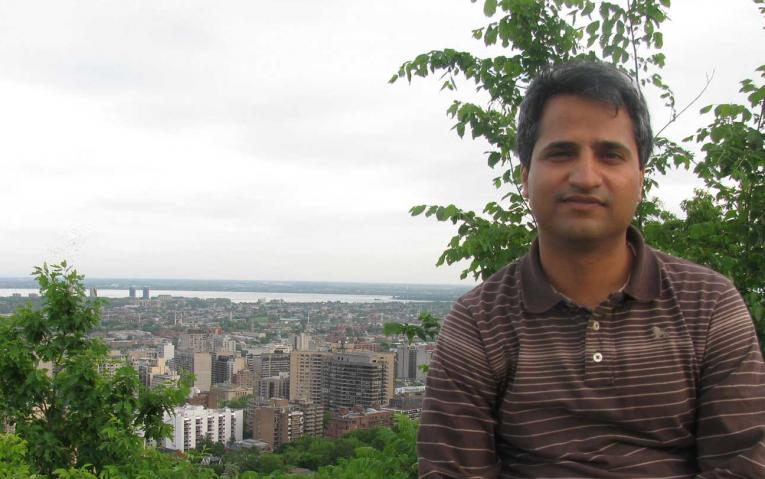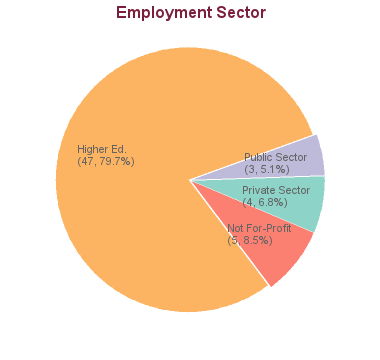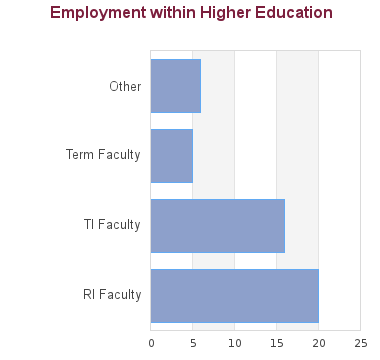
Ashwani Kumar
Job Title
Associate Professor
Employer
Mount Saint Vincent University
Applicants to Master’s and Doctoral degrees are not affected by the recently announced cap on study permits. Review more details
Graduate programs in the field of Curriculum Studies encompass, but are not limited to, investigations into: teacher education, the social construction of knowledge, the curriculum as culturally and politically situated, contemporary curriculum and instructional discourses, and the role of curriculum and curricular reform in K-12 and other learning environments. Students learn about issues of planning and development, program implementation and evaluation, and pre-service and in-service teacher education. Inquiry in the field is multi-disciplinary and includes numerous perspectives and orientations such as: cultural studies, historical consciousness, post structuralism, feminism, multicultural education, semiotics, and critical theory.
The Faculty of Graduate and Postdoctoral Studies establishes the minimum admission requirements common to all applicants, usually a minimum overall average in the B+ range (76% at UBC). The graduate program that you are applying to may have additional requirements. Please review the specific requirements for applicants with credentials from institutions in:
Each program may set higher academic minimum requirements. Please review the program website carefully to understand the program requirements. Meeting the minimum requirements does not guarantee admission as it is a competitive process.
Applicants from a university outside Canada in which English is not the primary language of instruction must provide results of an English language proficiency examination as part of their application. Tests must have been taken within the last 24 months at the time of submission of your application.
Minimum requirements for the two most common English language proficiency tests to apply to this program are listed below:
Overall score requirement: 92
Reading
22
Writing
22
Speaking
22
Listening
22
Overall score requirement: 6.5
Reading
6.0
Writing
6.0
Speaking
6.0
Listening
6.0
Some programs require additional test scores such as the Graduate Record Examination (GRE) or the Graduate Management Test (GMAT). The requirements for this program are:
The GRE is not required.
A Master's degree with high standing in a relevant educational discipline.
A letter of intent describing the focus of the proposed research and a sample of work demonstrating scholarly writing,
All applicants have to submit transcripts from all past post-secondary study. Document submission requirements depend on whether your institution of study is within Canada or outside of Canada.
A minimum of three references are required for application to graduate programs at UBC. References should be requested from individuals who are prepared to provide a report on your academic ability and qualifications.
Many programs require a statement of interest, sometimes called a "statement of intent", "description of research interests" or something similar.
Students in research-based programs usually require a faculty member to function as their thesis supervisor. Please follow the instructions provided by each program whether applicants should contact faculty members.
Permanent Residents of Canada must provide a clear photocopy of both sides of the Permanent Resident card.
All applicants must complete an online application form and pay the application fee to be considered for admission to UBC.
| Fees | Canadian Citizen / Permanent Resident / Refugee / Diplomat | International |
|---|---|---|
| Application Fee | $114.00 | $168.25 |
| Tuition * | ||
| Installments per year | 3 | 3 |
| Tuition per installment | $1,838.57 | $3,230.06 |
| Tuition per year (plus annual increase, usually 2%-5%) | $5,515.71 | $9,690.18 |
| Int. Tuition Award (ITA) per year (if eligible) | $3,200.00 (-) | |
| Other Fees and Costs | ||
| Student Fees (yearly) | $1,116.60 (approx.) | |
| Costs of living | Estimate your costs of living with our interactive tool in order to start developing a financial plan for your graduate studies. | |
Applicants to UBC have access to a variety of funding options, including merit-based (i.e. based on your academic performance) and need-based (i.e. based on your financial situation) opportunities.
From September 2024 all full-time students in UBC-Vancouver PhD programs will be provided with a funding package of at least $24,000 for each of the first four years of their PhD. The funding package may consist of any combination of internal or external awards, teaching-related work, research assistantships, and graduate academic assistantships. Please note that many graduate programs provide funding packages that are substantially greater than $24,000 per year. Please check with your prospective graduate program for specific details of the funding provided to its PhD students.
All applicants are encouraged to review the awards listing to identify potential opportunities to fund their graduate education. The database lists merit-based scholarships and awards and allows for filtering by various criteria, such as domestic vs. international or degree level.
Many professors are able to provide Research Assistantships (GRA) from their research grants to support full-time graduate students studying under their supervision. The duties constitute part of the student's graduate degree requirements. A Graduate Research Assistantship is considered a form of fellowship for a period of graduate study and is therefore not covered by a collective agreement. Stipends vary widely, and are dependent on the field of study and the type of research grant from which the assistantship is being funded.
Graduate programs may have Teaching Assistantships available for registered full-time graduate students. Full teaching assistantships involve 12 hours work per week in preparation, lecturing, or laboratory instruction although many graduate programs offer partial TA appointments at less than 12 hours per week. Teaching assistantship rates are set by collective bargaining between the University and the Teaching Assistants' Union.
Academic Assistantships are employment opportunities to perform work that is relevant to the university or to an individual faculty member, but not to support the student’s graduate research and thesis. Wages are considered regular earnings and when paid monthly, include vacation pay.
Canadian and US applicants may qualify for governmental loans to finance their studies. Please review eligibility and types of loans.
All students may be able to access private sector or bank loans.
Many foreign governments provide support to their citizens in pursuing education abroad. International applicants should check the various governmental resources in their home country, such as the Department of Education, for available scholarships.
The possibility to pursue work to supplement income may depend on the demands the program has on students. It should be carefully weighed if work leads to prolonged program durations or whether work placements can be meaningfully embedded into a program.
International students enrolled as full-time students with a valid study permit can work on campus for unlimited hours and work off-campus for no more than 20 hours a week.
A good starting point to explore student jobs is the UBC Work Learn program or a Co-Op placement.
Students with taxable income in Canada may be able to claim federal or provincial tax credits.
Canadian residents with RRSP accounts may be able to use the Lifelong Learning Plan (LLP) which allows students to withdraw amounts from their registered retirement savings plan (RRSPs) to finance full-time training or education for themselves or their partner.
Please review Filing taxes in Canada on the student services website for more information.
Applicants have access to the cost estimator to develop a financial plan that takes into account various income sources and expenses.
68 students graduated between 2005 and 2013: 3 are in non-salaried situations; for 6 we have no data (based on research conducted between Feb-May 2016). For the remaining 59 graduates:


These statistics show data for the Doctor of Philosophy in Curriculum Studies (PhD). Data are separated for each degree program combination. You may view data for other degree options in the respective program profile.
| 2023 | 2022 | 2021 | 2020 | 2019 | |
|---|---|---|---|---|---|
| Applications | 71 | 68 | 60 | 60 | 52 |
| Offers | 7 | 10 | 11 | 13 | 13 |
| New Registrations | 6 | 7 | 9 | 9 | 9 |
| Total Enrolment | 65 | 68 | 71 | 74 | 77 |
Students in research-based programs usually require a faculty member to function as their thesis supervisor. Please follow the instructions provided by each program whether applicants should contact faculty members.
These videos contain some general advice from faculty across UBC on finding and reaching out to a supervisor. They are not program specific.
This list shows faculty members with full supervisory privileges who are affiliated with this program. It is not a comprehensive list of all potential supervisors as faculty from other programs or faculty members without full supervisory privileges can request approvals to supervise graduate students in this program.
| Year | Citation |
|---|---|
| 2023 | Dr. Fuchs examined how secondary science teachers engaged in and with research as forms of professional development. Focusing on socio-scientific issues like climate change and the COVID-19 pandemic, his work offers frameworks for promoting social responsibility in science learning contexts. |
| 2023 | Dr. Thomas initiated a storefront art practice for art teachers to come together as a collective to contemplate the conditions for teaching. This study contributes to the field of teacher professional practices by offering experimental art and research approaches that permit teachers to deactivate the necessity to always be in a mode production. |
| 2023 | Dr. Diemert conducted her research in an international high school located in Costa Rica. A new term 'student-centered community-based learning' evolved with a focus on student agency in decision-making, problem solving, reflection, and community engagement. Students in the K-12 system and post-secondary education will benefit from this research. |
| 2023 | Dr. Edwards explored a school's experience implementing a food education program using a hydroponic shipping container farm (HSCF). This study found that despite substantial initial funding and administrative support, the financial and human capital needs for running a HSCF make it an unsustainable tool for delivering food education programming. |
| 2023 | Dr. Karangu investigated non-refugee teachers' teaching experiences in a long-term refugee camp, Dadaab, Kenya. His analysis demonstrates that there is little known about these non-refugee teachers. This research brings forward the voices of underrepresented teachers as it mattered to them through an Afrocentric lens. |
| 2023 | Dr. Anokwuru's dissertation examined how narratives of people with disabilities, their families, educators, and policymakers can inform inclusive education in Nigeria. Research findings advance the importance of self-advocacy, collaboration, and aligning change efforts across structures and roles, thereby designing an ecology of inclusive education. |
| 2023 | Dr. Hunter investigated urban youth sustainability leaders' competencies in engaging social innovative solutions to wicked problems. With a focus on self-transformation through values clarification and reflective discourse, she proposes a novel Transformative Sustainability Learning model that advances our understanding of sustainability education. |
| 2022 | Dr. Ryoo studied the question of what it means to act for amor mundi, the love of the world, at the intersections of art, aesthetics, education, philosophy,and politics. Her study invites us to examine commonly held conceptions in these disciplines and in our daily lives to understand our ethical, educational, social, and political responsibilities. |
| 2022 | Dr. Phuong Mai Huynh integrates the Zen views of life unto a pedagogy of home-inquiry that is inner discovery of one's subjective world. Through meditative, eco-poetic inquiry, she presents a pedagogy that reflects the embodied way of being, living, working, and creating in response to one's home-nature. |
| 2022 | Dr. Medina explored Indigenous mathematics through culture-based practices of his Maya Elders. His research demonstrates how Indigenous ways of knowing can engender greater awareness of meaningful mathematical heritages. Dr. Medina argues that mathematics, far from being immaterial and disembodied, is deeply material, human, and cultural. |
Curriculum Studies encompasses, but is not limited to, investigations into: teacher education, the social construction of knowledge, the curriculum as culturally and politically situated, contemporary curriculum and instructional discourses, and the role of curriculum and curricular reform in K-12 and other learning environments. Students learn about issues of planning and development, program implementation and evaluation, and pre-service and in-service teacher education. Inquiry in the field is multi-disciplinary and includes numerous perspectives and orientations such as: cultural studies, historical consciousness, post structuralism, feminism, multicultural education, semiotics, and critical theory.
Departments/Programs may update graduate degree program details through the Faculty & Staff portal. To update contact details for application inquiries, please use this form.

This city won’t disappoint. It has it all: sea, parks, mountains, beaches and all four seasons, including beautiful summers and mild, wet winters with snow.